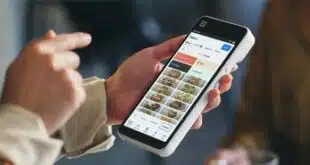Piggly Wiggly Carolina Co.'s decision to roll out a biometric payment system to all 85 stores in its chain was driven by both transaction-cost savings and customer interest, a senior executive for the Charleston, S.C.-based grocer says. In related news, Pay By Touch, the San Francisco-based company whose system Piggly Wiggly is using, says it has formed a marketing alliance with Certegy Inc. that will allow consumers to use Pay By Touch to cash paychecks in stores, and has started allowing consumers to begin signing up for the service over the Web. Piggly Wiggly says it will begin rolling out Pay By Touch late next month. It expects to complete the rollout, which includes 85 company-owned supermarkets, by late May. It will also offer the system to some 40 independent stores that operate under the company's name. The chain has stores in South Carolina and Georgia, with one scheduled to open next year in North Carolina. The decision to expand what has been a six-month, four-store pilot at four Charleston stores comes after the company saw it could shave transaction costs, says David Schools, a senior vice president at Piggly Wiggly. He says the company found it could switch enough check-writing customers to authenticated electronic debits over the automated clearing house to slightly more than offset Pay By Touch's transaction fee. “We anticipated [the cost] would be a slight loss but it was more positive than that,” says Schools. Pay By Touch, which authenticates consumers by comparing digitized finger scans taken in-lane with templates it stores in a central database, charges merchants 5 to 10 cents per transaction. Pay By Touch added ACH e-checks to its available payment channels during the Piggly Wiggly pilot. It also offers credit card payments, though among merchants it touts the system's ability to steer customers to the less costly ACH alternative (Digital Transactions News, March 10 and July 22, 2004). So far in the pilot, more than 15% of total transactions have flowed through Pay By Touch, a number Schools says amounts to a “substantial number of transactions.” He adds the company has been impressed by the feedback it is getting from customers. “It's something customers really like,” he says. “Customers [not in the pilot area] heard about it and asked why can't you put it in my store.” He says customers cite convenience as the most appealing feature of the system. Upon enrollment in Pay By Touch, consumers set up an electronic wallet, scan a fingerprint, enter a search code, and designate card and checking accounts to pay from. From that point, they no longer need to write checks or produce a card at the point of sale. They pay by touching a fingerprint scanner, which is usually an add-on to a card terminal. Schools says the scanners, which are peripherals for its VeriFone terminals, are costing the chain about $200 per lane. The remainder of its investment, he says, lies in $100,000 it spent on software integration. For the duration of the rollout, he says, the company will have to dedicate one employee per shift in all of its stores to help enroll customers and show them in the lanes how to use the system. “Our biggest expense during the rollout will be personnel,” he says. Meanwhile, Schools says Piggly Wiggly is looking at the new Certegy alliance with Pay By Touch but hasn't decided whether to adopt it. “We'll get through this rollout and take a look at it,” he says. Pay By Touch announced this week it had reached an agreement with Certegy, a St. Petersburg, Fla.-based transaction processor, to link the company's check-verification and -guarantee services to its authentication system. In this way, Pay By Touch users will for the first time be able to cash payroll and government checks in stores, with their identity authenticated by Pay By Touch and the transaction authorized by Certegy. Pay By Touch also announced it is now allowing consumers to begin the enrollment process on the Internet. Consumers can go to the company's Web site to enter ID and account numbers for the accounts they want to enroll. The site then gives a list of nearby retailers where they can complete enrollment at dedicated kiosks by entering a finger scan and a seven-digit search code, which is usually a phone number. Pay By Touch uses the search code to speed the process of matching data mathematically derived from finger scans taken at the point of sale with the stored templates. Once it has made a match, it forwards transactions to the appropriate payment networks. Web enrollment will cut enrollment time at the in-store kiosk to about 60 seconds from two minutes or so, Pay By Touch says. The company says it will promote the new service initially in the Portland, Ore., area, where it has stores accepting Pay By Touch. Each Pay By Touch transaction will enter the consumer into a sweepstakes for a Toyota Prius or a $50 Albertsons store gift card. Pay By Touch, which is accepted at stores in Washington state, Texas, New York, and Wisconsin, in addition to the Southeast, also operates an independent sales organization that serves 2,000 online merchants. In November it announced it is buying ATM Direct, an Irving, Texas-based company that offers a product that allows consumers to enter debit card PINs on the Internet to make purchases.
Check Also
A New Crypto Gateway and other Digital Transactions News briefs from 5/9/25
ONE.io, a specialist in digital-currency payments, and BoomFi, a cryptocurrency-technology provider, announced they will launch …



